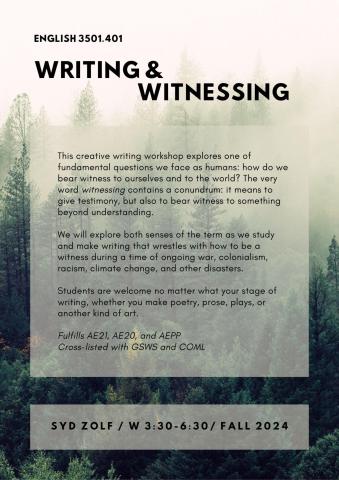Writing and Witnessing
This course will explore one of the fundamental questions we face as humans: how do we bear witness to ourselves and to the world? How do we live and write with a sense of response-ability to one another? How does our writing grapple with traumatic histories that continue to shape our world and who we are in it? The very word “witnessing” contains a conundrum within it: it means both to give testimony, such as in a court of law, and to bear witness to something beyond understanding, in a spiritual sense. In this class, we will explore both senses of the term “witness” as we study work by a number of writers and thinkers, including Claudia Rankine, Divya Victor, Paul Celan, Don Mee Choi, Saidiya Hartman, Layli Long Soldier, and Akilah Oliver, that wrestles with how to be a witness to oneself and others during a time of ongoing war, colonialism, racial violence, climate change, and other disasters. Students are welcome in this class no matter what stage you are at with writing, and whether you write poetry or prose or plays or make other kinds of art. Regardless of your experience, in this class you’ll be considered an “author,” which in its definition also means a “witness.” We will examine and question what authorship can do in the world, and we will analyze and explore the fine lines among being a witness, a bystander, a participant, a spectator, and an ally. In this class you will critically analyze and write responses to class readings; do writing exercises related to the work we read; and complete (and be workshopped on) a portfolio of creative writing (and art, if you choose) that bears witness to events that matter to you. Cross-listed with Gender, Sexuality, and Women’s Studies, and Comparative Literature.

 Department of English
Department of English
